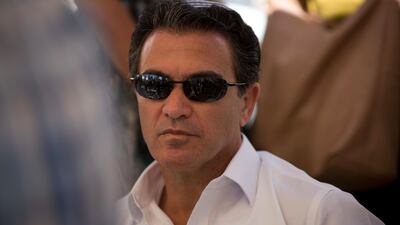The departing chief of Israel's Mossad intelligence service offered the closest acknowledgement yet that his country was behind recent attacks on Iran's nuclear programme and a military scientist.
The comments by Yossi Cohen made on Israel's Channel 12 investigative programme Uvda in a segment broadcast on Thursday night, offered an extraordinary debriefing by the head of the typically secretive agency in what appear to be the final days of Prime Minister Benjamin Netanyahu's rule.
He also gave a veiled warning to other nuclear scientists in Iran that they too could become targets, even as diplomats in Vienna try to negotiate terms to salvage its nuclear accord with world powers.
“If the scientist is willing to change career and will not hurt us any more, then yes, sometimes we offer them” a way out, Mr Cohen said.
Among the major attacks on Iran, none struck deeper than two explosions over the past year at its Natanz nuclear plant where centrifuges enrich uranium in an underground hall designed to protect them from air strikes.
In July 2020, a mysterious explosion tore apart Natanz’s advanced centrifuge assembly, which Iran later blamed on Israel. Another blast in April destroyed one of its underground enrichment halls.
When asked by the interviewer where he would take them if they could travel to Natanz, Mr Cohen said "to the cellar" where "the centrifuges used to spin".
“It doesn’t look like it used to look,” he said.
Mr Cohen did not directly claim the attacks, but his specificity offered the closest acknowledgement yet of an Israeli hand in the attacks.
His interviewer was also able to offer details of how Israel apparently smuggled explosives into Natanz’s underground halls.
“The man who was responsible for these explosions, it becomes clear, made sure to supply to the Iranians the marble foundation on which the centrifuges are placed,” journalist Ilan Dayan said in a voiceover. “As they install this foundation within the Natanz facility, they have no idea that it already includes an enormous amount of explosives.”
He also brought up the killing last November of Mohsen Fakhrizadeh, the Iranian scientist who began Tehran's military nuclear programme decades ago. US intelligence agencies and the International Atomic Energy Agency believe Iran abandoned that organised effort at seeking a nuclear weapon in 2003. Iran has always maintained that its programme is peaceful.
While Mr Cohen does not claim the killing on camera, Dayan says Mr Cohen “personally signed off on the entire campaign”. He also described how a remotely operated machinegun fixed to a pick-up truck killed Fakhrizadeh and later self-destructed.
Mr Cohen described an Israeli effort to dissuade Iranian scientists from taking part in the programme, some of whom abandoned their work after being warned, even indirectly, by Israel. Asked by the interviewer if the scientists understood the implications if they did not stop, Mr Cohen said: “They see their friends.”
Media policy in Israel requires journalists to clear stories involving security matters through military censors. That Mr Cohen’s remarks apparently cleared the censors suggests Israel wanted to issue a new warning to Iran amid the Vienna nuclear negotiations.
Iran has repeatedly complained about Israel’s attacks, with Iran’s ambassador to the IAEA Kazem Gharibabadi warning as recently as Thursday that the incidents “not only will be responded [to] decisively, but also certainly leave no option for Iran but to reconsider its transparency measures and co-operation policy”.
Mr Cohen, who will be replaced by former operative David Barnea, said in the interview that he might one day seek the prime minister’s office.










